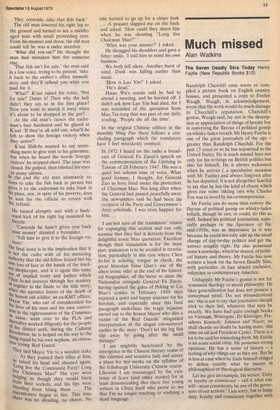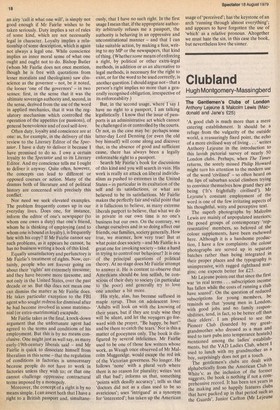Much missed
Alan Watkins
The Seven Deadly Sins Today Henry Fairlie (New Republic Books $10) Randolph Churchill once wrote or compiled a picture book on English country houses, and presented a copy to Evelyn Waugh. Waugh, in acknowledgement, wrote that the work would do much damage to Churchill's reputation. Churchill's genius, Waugh said, lay not in the description or appreciation of things of beauty but in conveying the flavour of political gossip on whisky-laden breath. Mr Henry Fairlie is one of the great journalists of the age — greater than Randolph Churchill. For the past 15 years or so he has sojourned in the United States. He is much missed here not only for his writings on British politics but also for himself. He is always welcomed when he arrives ( a speculative occasion with Mr Fairlie) and always forgiven after he has departed. It is not altogether fanciful to say that he has the kind of charm which gives one some inkling into why Charles Fox was so loved by his contemporaries.
Mr Fairlie can do more than convey the flavour of political gossip on whisky-laden breath, though he can, or could, do this as well. Indeed his political journalism, especially perhaps in the Spectator of the mid-1950s, was as impressive as it was because he could not only add up the small change of day-to-day politics and get the answer roughly right. He also possessed some knowledge, which he shared, of political history and theory. Mr Fairlie has now written a book on the Seven Deadly Sins, with particular, in fact almost exclusive, reference to contemporary America.
Unhappily Mr Fairlie's genius is not for systematic theology or moral philosophy. He likes generalisation but does not possess a conceptual mind. Do not misunderstand me: this is not to say that journalists should stick to their last, whatever that may be exactly. We have had quite enough books on Vietnam, Watergate, Dr Kissinger, Presidents Kennedy, Johnson and Nixon; we shall shortly no doubt be having more, this time on oil and President Carter. There is a lot to be said for something fresh. Mr Fairlie is an acute social critic. He possesses strong opinions. He has a sense of history — a feeling of why things are as they are. But he is less at ease when he finds himself obliged to define exactly what he means in philosophical or theological discourse.
Let me give an example. He writes: 'Duty or loyalty or conscience — call it what one will must consistently be one of the governors of our actions,' I am sorry, but to lump duty, loyalty and conscience together with an airy 'call it what one will', is simply not good enough if Mr Fairlie wishes to be taken seriously. Duty implies a set of rules of some kind, which are not necessarily legal in character. Loyalty implies a relationship of some description, which is again not always a legal one. While conscience implies an inner moral sense of what one ought and ought not to do. Bishop Butler (whom Mr Fairlie does not once mention, though he is free with quotations from lesser moralists and theologians) saw conscience as the governor — not, be it noted, the looser 'one of the governors' — in two senses: first, in the sense that it was the ultimate sovereign authority and, second, in the sense, derived from the use of the word in applied mechanics, that it was the regulatory mechanism which controlled the operation of the appetites (or passions), of general benevolence and of cool self-love.
Often duty, loyalty and conscience are at one: as, for example, in the delivery of this review to the Literary Editor of the Spectator. I have a duty to deliver it because I have promised to do so. I owe a certain loyalty to the Spectator and to its Literary Editor. And my conscience tells me I ought to deliver it anyway. Quite often, however, the concepts can lead to different or opposed courses or action. Many of the dramas both of literature and of political history are concerned with precisely this conflict.
Nor need we seek elevated examples. The problem frequently comes up in our everyday lives. Does one, for instance, inform the editor of one's newspaper (to whom one owes a duty) that one's friend, whom he is thinking of employing (and to whom one is bound in loyalty), is frequently late with his copy? If Mr Fairlie cannot see such problems, as it appears he cannot, he has no business writing a book of this kind.
Equally unsatisfactory and perfunctory is Mr Fairlie's treatment of rights. Now, certainly, people who are forever going on about their 'rights' are extremely tiresome; and they have become more tiresome, and not only in the United States, over the past decade or so. But this does not mean one can dismiss the matter as Mr Fairlie does. He takes particular exception to the FBI agent who sought redress for dismissal after he had become involved in some matrimonial (or extra-matrimonial) escapade.
Mr Fairlie takes as the final, knock-down argument that the unfortunate agent had agreed to the terms and conditions of his employment. But this is by no means conclusive. One might just as well say, as many .early-19th-century liberals said — and Mr Fairlie is quick to dissociate himself from liberalism in this sense — that the regulation of conditions in factories is unnecessary because people do not have to work in factories unless they wish to; or that one cannot challenge oppressive contractural terms imposed by a monopoly. . Moreover, the concept of a right is by no means simple. I can assert both that I have a right to a British passport and, simultane ously, that I have no such right. In the first usage I mean that, if the appropriate author ity arbitrarily refuses me a passport, the authority is behaving in an oppressive and unconstitutional manner — and that I can take suitable action, by making a fuss, writ ing to my MP or the newspapers, that kind of thing. (Whethersorne means of enforcing a right, by political or other extra-legal methods, in addition or as an alternative to legal methods, is necessary for the right to exist, or for the word to be used correctly, is another question. I should argue not that a person's right implies no more than a generally recognised obligation, irrespective of its enforceability.) But, in the second usage, where I say I have no right to a passport, I am talking legalistically. I know that the issue of passports is an administrative act which cannot be challenged in or controlled by the courts. Or not, as the case may be: perhaps some latter-day Lord Denning (or even the old boy himself) will come along and discover that, in the absence of good and sufficient cause, there has always been a legally enforceable right to a passport.
Search Mr Fairlie's book for discussions of this kind and you will search in vain. His work is really an attack on liberal individualism as pushed to extremes in the United States — in particular in its exaltation of the self and its satisfactions, or what are believed to be its satisfactions. Mr Fairlie makes the perfectly fair and valid point that it is fallacious to believe, as many extreme liberals purport to believe, that what we do in private in our own time is no one's business but our own. On the contrary, we change ourselves and in so doing affect our friends, our families, society generally. How true, we murmer, how very true! But at what point does society —and Mr Fairlie is a great one for invoking society — take a hand in trying to control our behaviour? It is one of the principal questions of political theory. At no stage does Mr Fairlie attempt to answer it. He is content to observe that Americans should be less selfish, be conscious of their duty to society (in particular to the poor) and generally try to love one another a bit more.
His style, alas, has become suffused in maple syrup. Thus on adolescent love: 'Adults will look on with the knowing of their years, but if they are truly wise they will be silent, and let the voyagers go forward with the prayer, "Be happy, be hurt" and be there to catch the tears.' Nor is this a matter of gooeyness only. The book is disfigured by several infelicities. Mr Fairlie used to be one of those few writers whose work, as Waugh once observed of Mr Malcolm Muggeridge, would escape the red ink of the Victorian governess. No longer. He follows 'none' with a plural verb where there is no reason for plurality; writes 'not all that bad'; informs us that, something 'points with deadly accuracy': tells us that 'doctors did not as a class used to be so avaricious': uses 'intrigued' as a synonym for 'interested': has taken up the American usage of 'perceived': has the keystone of an arch 'running through almost everything': and appears to have forgotten the use of 'which' as a relative pronoun. Altogether we must hate the sin, in this case the book, but nevertheless love the sinner.































 Previous page
Previous page